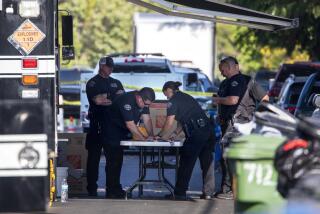A Reluctant Return to an L.A. Olympic Moment
- Share via
For 12 years, Jimmy W. Pearson has wanted the world to forget the day he tried to make himself a hero at the Los Angeles Olympics by planting, then discovering, a nonexplosive device that looked like a bomb. But the media have a long memory.
That’s why he felt a “cold chill” when television brought him the news that a security guard was suspected of being the Atlanta Olympics bomber.
It was only a matter of time until the reporters came, until the event that he wanted to forget was resurrected by the media. Sure enough, on Tuesday, immediately after the guard, Richard Jewell, was named as a suspect, television replayed pictures showing how Pearson, then a nine-year Los Angeles police officer, became an instant hero for spotting a pipe bomb on the Turkish team’s baggage bus and tossing it onto a runway.
And on Wednesday, just as Pearson knew we would, we tracked him down to the San Fernando Valley ranch-style house where he had lived in obscurity, earning a living as a diver.
*
I joined reporter Cater Lee and cameraman Ben Weatherly of KNBC-TV interviewing Pearson outside his backyard gate.
He’s a good-looking man with a square face, a straightforward manner and a soft way of speaking. He wore a T-shirt and khaki shorts.
“I’d prefer not being interviewed,” he said. But Weatherly kept shooting, and I took notes.
Pearson could have walked away. But there seemed to be an innate courtesy about the man, who pleaded guilty to possession of an explosive and got five years’ probation. He said he understood we had our jobs to do. And he was struggling with an urge to tell his side of the story.
“There is a part of me that wants to tell the world that I am not a bad guy,” he said. “But saying this is self-serving.”
We wondered how Pearson, who watches the Olympics closely, felt when he heard about the bombing, and then when suspicion fell on the security guard.
Pearson cautioned us against concluding the guard was guilty. But, no matter who committed the crime, Pearson was angry “because of what he did and because of what he did to me.”
“Do I deserve to be judged for the best day of my life or the worst day of my life?
“My friends ask me if this is going to be your epitaph? When you die, is this going to be on your tombstone?”
Despite the media’s instant analysis, Pearson said his case had no similarity to the Atlanta bombing. He never hurt anyone. “It wasn’t intended to hurt,” he said. “It was a hoax device.”
He was suffering from feelings of inadequacy at the time, combined with an intense drive to succeed. He’d made it to the LAPD’s elite Metro Squad, but still felt he’d fallen short.
“I can see people now who have the same kind of problem,” he said. “Low self-esteem. You keep elevating your heights up and up and up. I was a good cop. Guess who didn’t know it.”
His phone rang. He said he had to go inside to answer it. We thanked him for his time and left.
*
I drove away with mixed feelings--pleased that I had found Pearson and gotten the interview but uncomfortable about disturbing his privacy after all those years.
Some of my colleagues will justify such invasions by high-toned explanations that the interviews shed light on the psychology of wannabe heroes.
That’s saying that Jimmy Pearson, who never hurt anybody, has something in common with an Atlanta killer who stuffed the pipe bomb with deadly material.
Nonsense.
Jimmy Pearson’s case was unique, as are most of these things. It’s fashionable to generalize about what makes people tick, to engage in glib pop psychology.
But to do so is misleading, and usually downright wrong.
More to Read
Go beyond the scoreboard
Get the latest on L.A.'s teams in the daily Sports Report newsletter.
You may occasionally receive promotional content from the Los Angeles Times.






